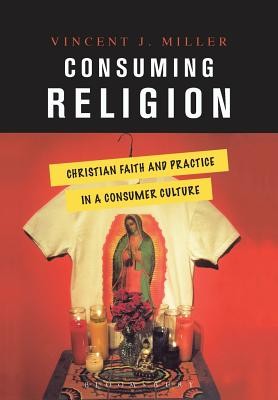
- We will send in 10–14 business days.
- Author: Vincent J Miller
- Publisher: Continuum
- ISBN-10: 0826417493
- ISBN-13: 9780826417497
- Format: 16.8 x 24.1 x 1.8 cm, softcover
- Language: English
- SAVE -10% with code: EXTRA
Reviews
Description
Contemporary theology, argues Miller, is silent on what is unquestionably one of the most important cultural issues it faces: consumerism or consumer culture. While there is no shortage of expressions of concern about the corrosive effects of consumerism from the standpoint of economic justice or environmental ethics, there is a surprising paucity of theoretically sophisticated works on the topic, for consumerism, argues Miller, is not just about behavioral excesses; rather, it is a pervasive worldview that affects our construction as persons-what motivates us, how we relate to others, to culture, and to religion. Consuming Religion surveys almost a century of scholarly literature on consumerism and the commodification of culture and charts the ways in which religious belief and practice have been transformed by the dominant consumer culture of the West. It demonstrates the significance of this seismic cultural shift for theological method, doctrine, belief, community, and theological anthropology. Like more popular texts, the book takes a critical stand against the deleterious effects of consumerism. However, its analytical complexity provides the basis for developing more sophisticated tactics for addressing these problems.
EXTRA 10 % discount with code: EXTRA
The promotion ends in 20d.21:33:04
The discount code is valid when purchasing from 10 €. Discounts do not stack.
- Author: Vincent J Miller
- Publisher: Continuum
- ISBN-10: 0826417493
- ISBN-13: 9780826417497
- Format: 16.8 x 24.1 x 1.8 cm, softcover
- Language: English English
Contemporary theology, argues Miller, is silent on what is unquestionably one of the most important cultural issues it faces: consumerism or consumer culture. While there is no shortage of expressions of concern about the corrosive effects of consumerism from the standpoint of economic justice or environmental ethics, there is a surprising paucity of theoretically sophisticated works on the topic, for consumerism, argues Miller, is not just about behavioral excesses; rather, it is a pervasive worldview that affects our construction as persons-what motivates us, how we relate to others, to culture, and to religion. Consuming Religion surveys almost a century of scholarly literature on consumerism and the commodification of culture and charts the ways in which religious belief and practice have been transformed by the dominant consumer culture of the West. It demonstrates the significance of this seismic cultural shift for theological method, doctrine, belief, community, and theological anthropology. Like more popular texts, the book takes a critical stand against the deleterious effects of consumerism. However, its analytical complexity provides the basis for developing more sophisticated tactics for addressing these problems.


Reviews